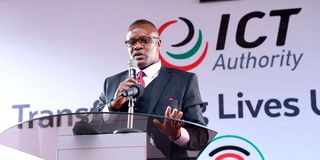Making government Wi-Fi hotspots work

Information, Communication and Digital Economy Cabinet Secretary Eliud Owalo. The government plans to set up 25,000 public Wi-Fi spots. This will help people in rural areas get connected and enjoy the benefits of the digital world.
In today’s world, technology has become incredibly powerful and can change economies and improve people’s lives all over the world. We’re on the edge of a big digital revolution, so it’s important for the government to act and use technology to help the economy grow and create a brighter future for Kenyans.
President William Ruto recently said that he wants to bring internet access to even the remotest places by setting up 25,000 public Wi-Fi spots. This will help people in rural areas get connected and enjoy the benefits of the digital world. The President also promised to digitise 5,000 government services within six months.
This means that records and government processes will be digital, making it easier for different government departments to share information, and people will only need one ID to access online services.
To make these promises happen, the government needs to invest in a strong digital infrastructure. This means things like broadband networks, data centres and digital platforms that provide fast and reliable internet connections. It’s important that everyone can get online easily.
By improving internet access in rural and underserved areas, the government will open new economic opportunities and empower young people. However, these initiatives need a lot of resources that the government might not have, so they will need to work with private companies, international organisations and collaborate with other countries to make it happen.
Working together with private companies is important because they can help develop new and innovative ideas, and share their expertise and resources.
This collaboration ensures that the technology projects meet the needs and dreams of the people and help everyone grow together.
But just having infrastructure isn’t enough to create jobs and improve the economy. The government needs to focus on teaching digital skills and education to young people.
Lifelong learning
It needs to integrate technology into schools, offering training programmes to impart digital skills, and supporting lifelong learning. By investing in people's knowledge and skills, the government can help them take advantage of the digital economy and all the opportunities it offers.
Using technology also brings new risks, like cyber threats and privacy issues. That’s why the government needs to make sure there are rules and regulations to protect people’s digital rights and privacy.
There is also a need to work on cybersecurity to keep everyone safe online.
When people trust that their information is secure, they'll feel more comfortable using technology and the digital economy will thrive.
Investments in research and developing new technologies are a necessity.
By funding research, encouraging innovation and supporting private companies in their work, the government can help create new and exciting discoveries. This will keep Kenya at the forefront of innovation, make the economy stronger, and ensure a bright future for everyone.
Mr Wambugu is an accredited expert in cloud and cyber security. [email protected] Twitter: @Samwambugu2





